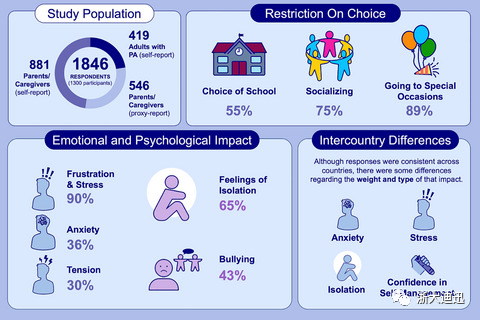Release date:2020-11-20

Allergy
[IF:6.771]
A multiple-country European survey assessing the psychosocial impact of peanut allergyDOI: 10.1111/all.14363
Abstract:
Background: Peanut allergy (PA) is a common, potentially life-threatening and typically lifelong condition with a significant burden of illness. However, information is lacking on how persons with PA (PwPA) and their caregivers perceive the psychosocial impact of living with PA. The Allergy to Peanuts imPacting Emotions And Life 1(APPEAL-1) survey, conducted across Europe, investigated the experience and impact of living with PA. Here, we report data evaluating the psychosocial impact of PA on PwPA and their caregivers.
Methods: Allergy to Peanuts imPacting Emotions And Life study 1 was an online survey conducted in eight European countries. Representatives of eight patient advocacy groups and five healthcare-research specialists developed the survey. Eligible respondent groups included the following: adults diagnosed with PA (self-report);parent/nonparent caregivers (proxy-report for a child with PA); and parent/nonparent caregivers (self-report of PA impact on themselves).
Results: Of 1846 total study respondents, 419 were adults with PA (self-report); 546 were parents/caregivers (proxy-report); and 881 were parents/caregivers (selfreport). Most respondents reported lifestyle restrictions regarding food (84%-93%) and additional domains including parties and socializing, holiday activities and destinations, and taking public transport (53%-89%). Approximately 40% rated themselves as “very” frustrated and “very” stressed. Two-thirds (65%) felt socially isolated; 43% were bullied. Less than half felt confident in knowing when to use an adrenaline autoinjector. Several intercountry differences were observed such as high levels of uncertainty and stress in respondents from Ireland, highest rates of anxiety in respondents from Germany, and social exclusion and isolation most common in respondents from France.
Conclusion: Peanut allergy imposes an adverse psychosocial impact on patients and caregivers, leading to frustration, stress and isolation. Attention to the impact of PA is needed in research and clinical practice to improve PA healthcare and public education programmes.
First Author:
Audrey DunnGalvi
Correspondence:
School of Applied Psychology and Department of Paediatrics and Child Health, University College Cork, Cork, Ireland.
All Authors:
Audrey DunnGalvin, Katharina Blumchen, Frans Timmermans, Lynne Regent, Sabine Schnadt, Marcia Podestà, Angel Sánchez, Pascale Couratier, Mary Feeney, Betina Hjorth, Ram Patel, Tessa Lush, Robert Ryan, Andrea Vereda, Montserrat Fernández-Rivas, Helen R. Fisher
2020-11-20 Article
 杭州浙大迪迅生物基因工程有限公司
杭州浙大迪迅生物基因工程有限公司
